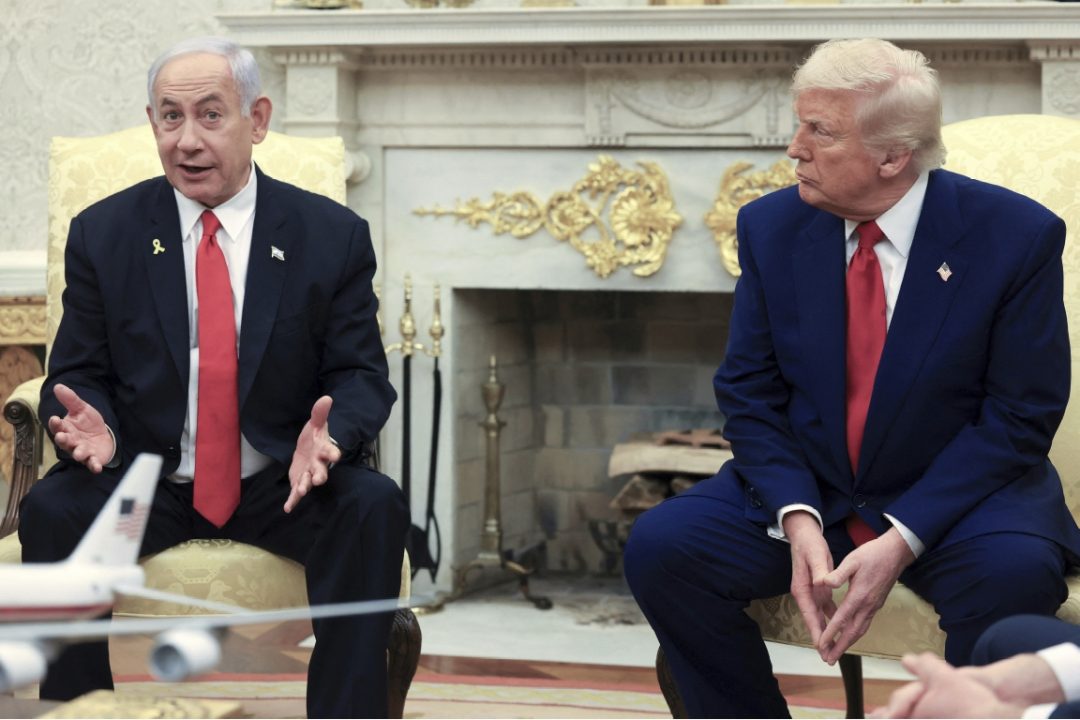
President Trump “waved off” a planned Israeli strike against Iran’s nuclear facilities, a move that terminated what The New York Times has reported was “months of internal debate” to settle for diplomacy over Israel’s plan to vaporize the facilities.
The startling revelation also revealed that military authorities moved forces to support a strike. But Vice President J.D. Vance, Defense Secretary Pete Hegseth, and Director of National Intelligence Tulsi Gabbard pushed Trump to oppose it. The attack was set for May.
For now, it appears that Trump will keep his promise to keep the United States out of more wars.
“Fault Lines”
Inside the administration were “fault lines between historically hawkish American cabinet officials and other aides more skeptical that a military assault on Iran could destroy the country’s nuclear ambitions and avoid a larger war,” the Times reported.
For now, officials have reached a “rough consensus” against a strike, and Iran is willing to negotiate, the newspaper continued.
Importantly, Trump’s blocking the attack kept the United States from becoming involved in a wider war with Iran:
Israeli officials had recently developed plans to attack Iranian nuclear sites in May. They were prepared to carry them out, and at times were optimistic that the United States would sign off. The goal of the proposals, according to officials briefed on them, was to set back Tehran’s ability to develop a nuclear weapon by a year or more.
Almost all of the plans would have required U.S. help not just to defend Israel from Iranian retaliation, but also to ensure that an Israeli attack was successful, making the United States a central part of the attack itself.
Trump has undoubtedly enraged the neoconservative-neoliberal globalist alliance that seeks to involve the United States in wars across the globe, most notably with Ukraine in its losing fight against Russia.
That aside, the Times reported that Iran has a “deadline of just a few months” to craft a settlement regarding its nuclear program. And Trump told Israeli Prime Minister Benjamin Netanyahu that the United States wouldn’t support an attack just before he landed in Washington, D.C., for a meeting last week.
“In a statement delivered in Hebrew after the meeting, Mr. Netanyahu said that an agreement with Iran would work only if it allowed the signers to ‘go in, blow up the facilities, dismantle all the equipment, under American supervision with American execution,’” the Times reported.
Israel had been planning the attack for some time, “rehearsing bombing runs and calculating how much damage it could do with or without American help,” the newspaper continued:
But support within the Israeli government for a strike grew after Iran suffered a string of setbacks last year.
In attacks on Israel in April, most of Iran’s ballistic missiles were unable to penetrate American and Israeli defenses. Hezbollah, Iran’s key ally, was decimated by an Israeli military campaign last year. The subsequent fall of the government of President Bashar al-Assad in Syria eliminated a Hezbollah and Tehran ally and cut off a prime route of weapons smuggling from Iran.
Air defense systems in Iran and Syria were also destroyed, along with the facilities that Iran uses to make missile fuel, crippling the country’s ability to produce new missiles for some time.
The Israelis revealed to American officials a plan to dispatch commandos, with American bomber support, to destroy subterranean nuclear facilities.
American Help Ready
Top American officials, including General Michael Kurilla, chief of Central Command, and National Security Advisor Michael Waltz, were ready to help Israel, the Times reported. The USS Carl Vinson moved to the Arabian Sea, and two Patriot missile batteries and a Terminal High Altitude Area Defense (THAAD) system also went to the area.
As well, the United States stationed “B-2 bombers capable of carrying 30,000-pound bombs essential to destroying Iran’s underground nuclear program” at the U.S. base at Diego Garcia in the Indian Ocean.
Officials also considered moving fighter aircraft to the area, possibly to Israel.
“All of the equipment could be used for strikes against the Houthis — whom the United States has been attacking since March 15 in an effort to halt their strikes against shipping vessels in the Red Sea,” the Times reported:
But U.S. officials said privately that the weaponry was also part of the planning for potentially supporting Israel in a conflict with Iran.
Even if the United States decided not to authorize the aircraft to take part in a strike on Iran, Israel would know that the American fighters were available to defend against attacks by an Iranian ally.
Israel thought Trump might “take an aggressive” line for two reasons. First, he ordered the drone-strike assassination of Iranian Qasem Soleimani, Iran’s special operation chief. Second, Iran allegedly plotted to assassinate Trump.
Skeptics Prevail for Now
“But inside the Trump administration, some officials were becoming skeptical of the Israeli plan,” the Times reported:
In a meeting this month — one of several discussions about the Israeli plan — Tulsi Gabbard, the director of national intelligence, presented a new intelligence assessment that said the buildup of American weaponry could potentially spark a wider conflict with Iran that the United States did not want.
A range of officials echoed Ms. Gabbard’s concerns in the various meetings. Susie Wiles, the White House chief of staff; Defense Secretary Pete Hegseth; and Vice President JD Vance all voiced doubts about the attack.
Even Mr. Waltz, frequently one of the most hawkish voices on Iran, was skeptical that Israel’s plan could succeed without substantial American assistance.
Trump invited Iran to open negotiations, and on March 28, Iran replied. It was open to talks.
When Netanyahu visited Trump last week, Trump told him that the United States would not support an attack during negotiations, officials told the Times. Still, Trump said a strike was not out of the question.
After the Times published its report, Netanyahu’s office warned that “Israel will not allow Iran to obtain nuclear weapons.”
The Times also detailed Israeli plans to destroy Iran’s nuclear facilities with combined Israeli commando and American airstrikes.




